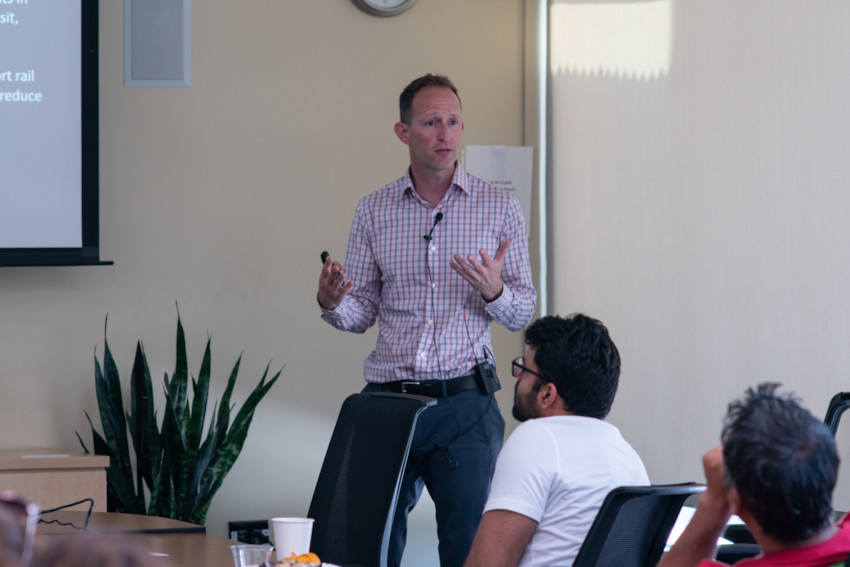News | UCLA's Mike Manville Explains How Strategies Used to Win Votes for Transit Funding Can Run Counter to Increasing Ridership
Stop the VideoNews

METRANS UTC
UCLA's Mike Manville Explains How Strategies Used to Win Votes for Transit Funding Can Run Counter to Increasing Ridership
Sunday, May 19, 2019
by By: Seth Karten, UC Davis
In the past 20 years, citizens around the United States have voted to pass hundreds of local or state measures to increase their own taxes to finance transportation. Fifty such measures in 2016 dedicated their revenue specifically to public transit. Yet, transit ridership has decreased as financing has increased. Understanding this paradox was the focus of the May 10 seminar, hosted by the Institute of Transportation Studies at UC Davis (ITS-Davis) and sponsored through its partnership with the Pacific Southwest Region University Transportation Center.
Dr. Michael Manville, an associate professor of urban planning at the UCLA Luskin School of Public Affairs, was the featured speaker of the seminar, entitled “Measure M and the (Potential) Transformation of Mobility in Los Angeles.” He described his research to better understand why, in 2016, the voters of Los Angeles County, passed, for the fourth time since 1980, a measure to increase their taxes in support of transit, meanwhile transit ridership has declined since 1980.

Manville first examined documents from LA Metro?the local transit agency?describing the political strategies used to promote Measure M. The primary strategy was to sell the measure as a means of reducing congestion and, to a lesser degree, of protecting the environment. The documents indicated that the campaign would not market the measure as a means of transforming LA County or changing people’s travel behavior. While such a strategy of not suggesting the need for behavior change may be effective in winning votes, in this case it was the opposite of the nominal goal of the measure?to transform Los Angeles into a city with a much larger transit ridership.
To further understand voter thinking, Manville conducted a survey of 1450 adults one week after election day. The survey included questions about issues needing attention and then about transportation and Measure M. A statistical analysis of the results (i.e., logistic regression model) indicated that voting in favor of Measure M was strongly associated with: thinking about Measure M when you thought about congestion, having a Democratic party affiliation, and having positive beliefs about transit. However, support for M was not associated with simply believing that congestion was a major problem that needed to be addressed.
Perhaps most revealing were additional survey questions showing that even most supporters of Measure M would not support policies that would actually increase transit use, such as reducing parking spaces, increasing housing density, or placing tolls on congested freeways.
In sum, in the context of Measure M, the political support for transit appeared to be a function of attitudes and ideologies, but ridership of transit seemed to remain a function of socioeconomic status.
A further concern Manville and some others in LA have is that the consensus on sales tax to support transit conceals more contentious issues that need to be addressed for the city to create a working transit system: such as giving buses priorities on streets, pricing congested roads, reducing parking, and building housing densely along transit corridors.
Michael Manville is an associate professor of urban planning at the UCLA Luskin School of Public Affairs. His research and teaching focus on the relationships between transportation and land use, and on local public finance. Much of his research concerns the tendency of local governments to hide the costs of driving in the property market, through land use restrictions intended to fight traffic congestion. These land use laws only sometimes reduce congestion and can profoundly influence the supply and price of housing.
You can view a full recording of Mike Manville’s talk, part of ITS-Davis’ weekly seminar series, by clicking on Watch Video at the URL https://its.ucdavis.edu/seminar/may-10-2019/. In addition, a full report on the research presented in the seminar is available here.
Seth Karten is a science writer at the Institute of Transportation Studies at UC Davis (ITS-Davis).
News Archive
- December (1)
- November (6)
- October (4)
- September (2)
- August (3)
- July (4)
- June (3)
- May (7)
- April (8)
- March (11)
- February (8)
- January (7)
- December (7)
- November (8)
- October (11)
- September (11)
- August (4)
- July (10)
- June (9)
- May (2)
- April (12)
- March (8)
- February (7)
- January (11)
- December (11)
- November (5)
- October (16)
- September (7)
- August (5)
- July (13)
- June (5)
- May (5)
- April (7)
- March (5)
- February (3)
- January (4)
- December (4)
- November (5)
- October (5)
- September (4)
- August (4)
- July (6)
- June (8)
- May (4)
- April (6)
- March (6)
- February (7)
- January (7)
- December (8)
- November (8)
- October (8)
- September (15)
- August (5)
- July (6)
- June (7)
- May (5)
- April (8)
- March (7)
- February (10)
- January (12)















